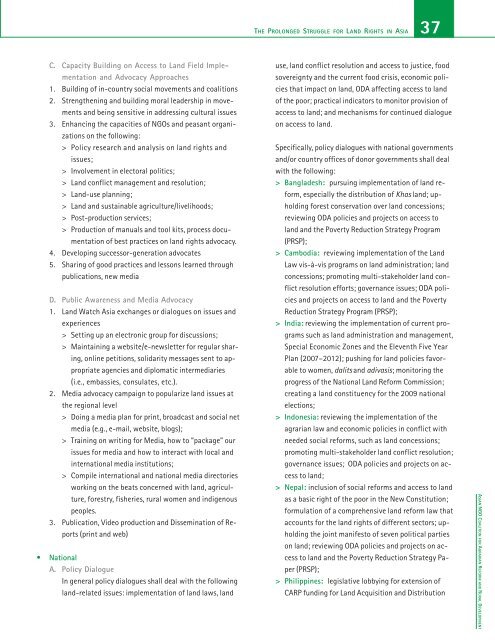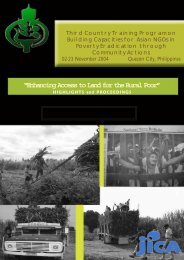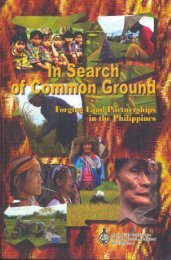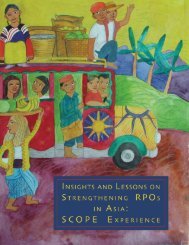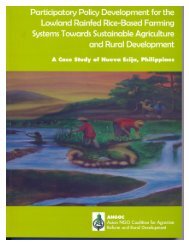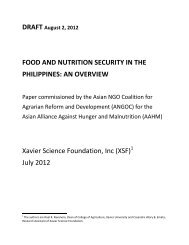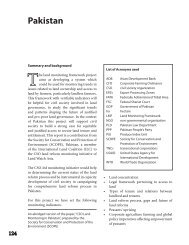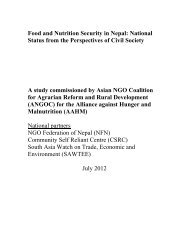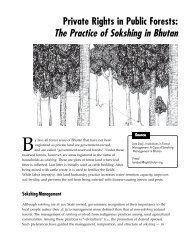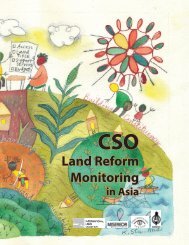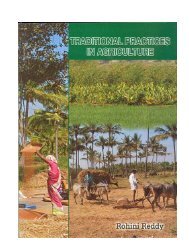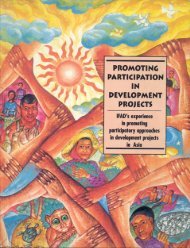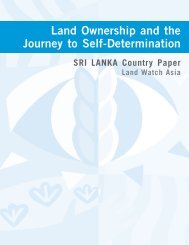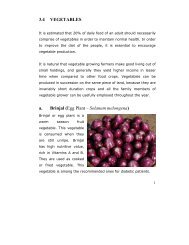Securing the Right to Land FULL - ANGOC
Securing the Right to Land FULL - ANGOC
Securing the Right to Land FULL - ANGOC
Create successful ePaper yourself
Turn your PDF publications into a flip-book with our unique Google optimized e-Paper software.
C. Capacity Building on Access <strong>to</strong> <strong>Land</strong> Field Implementation<br />
and Advocacy Approaches<br />
1. Building of in-country social movements and coalitions<br />
2. Streng<strong>the</strong>ning and building moral leadership in movements<br />
and being sensitive in addressing cultural issues<br />
3. Enhancing <strong>the</strong> capacities of NGOs and peasant organizations<br />
on <strong>the</strong> following:<br />
> Policy research and analysis on land rights and<br />
issues;<br />
> Involvement in elec<strong>to</strong>ral politics;<br />
> <strong>Land</strong> conflict management and resolution;<br />
> <strong>Land</strong>-use planning;<br />
> <strong>Land</strong> and sustainable agriculture/livelihoods;<br />
> Post-production services;<br />
> Production of manuals and <strong>to</strong>ol kits, process documentation<br />
of best practices on land rights advocacy.<br />
4. Developing successor-generation advocates<br />
5. Sharing of good practices and lessons learned through<br />
publications, new media<br />
D. Public Awareness and Media Advocacy<br />
1. <strong>Land</strong> Watch Asia exchanges or dialogues on issues and<br />
experiences<br />
> Setting up an electronic group for discussions;<br />
> Maintaining a website/e-newsletter for regular sharing,<br />
online petitions, solidarity messages sent <strong>to</strong> appropriate<br />
agencies and diplomatic intermediaries<br />
(i.e., embassies, consulates, etc.).<br />
2. Media advocacy campaign <strong>to</strong> popularize land issues at<br />
<strong>the</strong> regional level<br />
> Doing a media plan for print, broadcast and social net<br />
media (e.g., e-mail, website, blogs);<br />
> Training on writing for Media, how <strong>to</strong> “package” our<br />
issues for media and how <strong>to</strong> interact with local and<br />
international media institutions;<br />
> Compile international and national media direc<strong>to</strong>ries<br />
working on <strong>the</strong> beats concerned with land, agriculture,<br />
forestry, fisheries, rural women and indigenous<br />
peoples.<br />
3. Publication, Video production and Dissemination of Reports<br />
(print and web)<br />
National<br />
A. Policy Dialogue<br />
In general policy dialogues shall deal with <strong>the</strong> following<br />
land-related issues: implementation of land laws, land<br />
THE PROLONGED STRUGGLE FOR LAND RIGHTS IN ASIA<br />
37<br />
use, land conflict resolution and access <strong>to</strong> justice, food<br />
sovereignty and <strong>the</strong> current food crisis, economic policies<br />
that impact on land, ODA affecting access <strong>to</strong> land<br />
of <strong>the</strong> poor; practical indica<strong>to</strong>rs <strong>to</strong> moni<strong>to</strong>r provision of<br />
access <strong>to</strong> land; and mechanisms for continued dialogue<br />
on access <strong>to</strong> land.<br />
Specifically, policy dialogues with national governments<br />
and/or country offices of donor governments shall deal<br />
with <strong>the</strong> following:<br />
> Bangladesh: pursuing implementation of land reform,<br />
especially <strong>the</strong> distribution of Khas land; upholding<br />
forest conservation over land concessions;<br />
reviewing ODA policies and projects on access <strong>to</strong><br />
land and <strong>the</strong> Poverty Reduction Strategy Program<br />
(PRSP);<br />
> Cambodia: reviewing implementation of <strong>the</strong> <strong>Land</strong><br />
Law vis-à-vis programs on land administration; land<br />
concessions; promoting multi-stakeholder land conflict<br />
resolution efforts; governance issues; ODA policies<br />
and projects on access <strong>to</strong> land and <strong>the</strong> Poverty<br />
Reduction Strategy Program (PRSP);<br />
> India: reviewing <strong>the</strong> implementation of current programs<br />
such as land administration and management,<br />
Special Economic Zones and <strong>the</strong> Eleventh Five Year<br />
Plan (2007–2012); pushing for land policies favorable<br />
<strong>to</strong> women, dalits and adivasis; moni<strong>to</strong>ring <strong>the</strong><br />
progress of <strong>the</strong> National <strong>Land</strong> Reform Commission;<br />
creating a land constituency for <strong>the</strong> 2009 national<br />
elections;<br />
> Indonesia: reviewing <strong>the</strong> implementation of <strong>the</strong><br />
agrarian law and economic policies in conflict with<br />
needed social reforms, such as land concessions;<br />
promoting multi-stakeholder land conflict resolution;<br />
governance issues; ODA policies and projects on access<br />
<strong>to</strong> land;<br />
> Nepal: inclusion of social reforms and access <strong>to</strong> land<br />
as a basic right of <strong>the</strong> poor in <strong>the</strong> New Constitution;<br />
formulation of a comprehensive land reform law that<br />
accounts for <strong>the</strong> land rights of different sec<strong>to</strong>rs; upholding<br />
<strong>the</strong> joint manifes<strong>to</strong> of seven political parties<br />
on land; reviewing ODA policies and projects on access<br />
<strong>to</strong> land and <strong>the</strong> Poverty Reduction Strategy Paper<br />
(PRSP);<br />
> Philippines: legislative lobbying for extension of<br />
CARP funding for <strong>Land</strong> Acquisition and Distribution<br />
ASIAN NGO COALITION FOR AGRARIAN REFORM AND RURAL DEVELOPMENT


